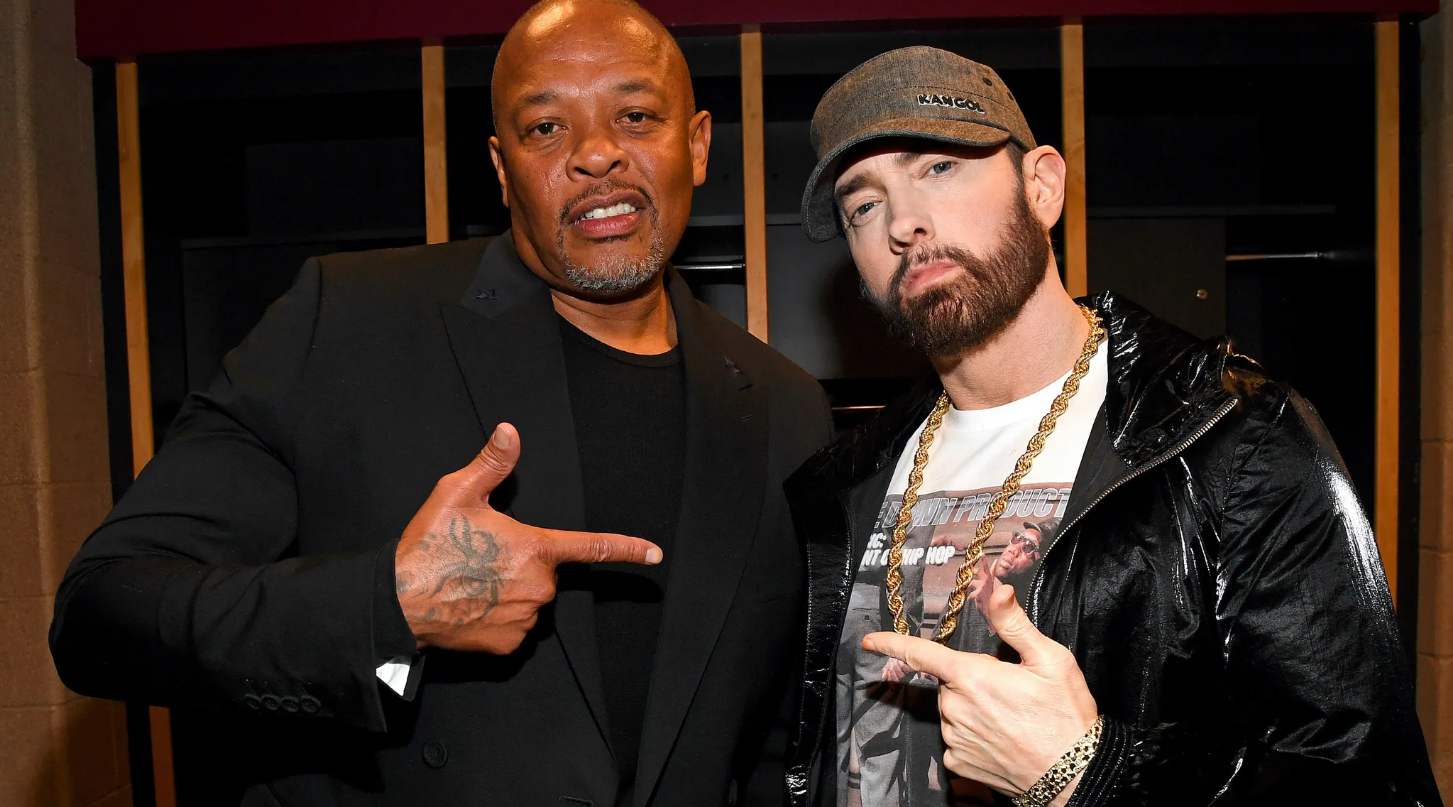Dr. Dre, born Andre Romelle Young, is a highly respected figure in the realm of American music, particularly in the hip hop genre. Born in 1965 in Compton, California, Dre’s passion for music was evident from a young age, and he soon made a name for himself as a member of the groundbreaking group N.W.A. His innovative production style, which incorporated elements of funk, soul, and R&B into the traditional hip hop sound, revolutionized the genre and helped popularize the West Coast G-funk style.
After leaving N.W.A., Dre embarked on a successful solo career and released the album “The Chronic” in 1992, which is often considered one of the greatest rap albums of all time. His skills as a producer also came to the forefront as he discovered and mentored several talented artists, including Eminem and 50 Cent, and produced numerous hit records.
In 2006, Dre ventured into the business world by co-founding Beats Electronics, a company that produces audio products, including the highly popular Beats by Dre headphones. The company was acquired by Apple Inc. in 2014 for $3 billion, making Dre one of the richest figures in the music industry.
Despite his immense success, Dre’s journey has not been without its challenges. He has faced criticism and controversy over his treatment of women, both in his personal life and in his music. However, he has expressed regret for his past actions and has strived to make amends.
Dr. Dre’s influence on the music industry is undeniable. His innovative production techniques have shaped the sound of hip hop, and his mentorship of other artists has helped to launch the careers of some of the genre’s biggest stars. Despite the controversies that have marred his reputation, Dre’s impact on music and popular culture is indisputable. His journey from the streets of Compton to the pinnacle of the music industry is a testament to his talent, perseverance, and entrepreneurial spirit.

Early Life and Background
Born and raised in the serene countryside of North Dakota, Jane Smith spent her formative years surrounded by lush green fields, bountiful harvests, and a tight-knit community that valued hard work and perseverance. Her parents, second-generation farmers, instilled in Jane an appreciation for the earth and its bounties, as well as a strong work ethic, from a young age. She would rise with the sun, helping her parents with the daily chores, and study under the soft glow of lanterns after the sun had set.
Jane was the eldest of four children, and her early responsibilities included not only helping her parents in the field but also looking after her younger siblings. This early introduction to responsibility cultivated a sense of maturity and leadership in Jane, which would guide her throughout her life.
Education was a priority in the Smith household, despite their remote location and the demands of farm life. Jane’s parents ensured their children received a quality education, driving them to and from the nearest town for school. Jane thrived in this academic setting, her natural curiosity and intelligence shining through.
In her early teens, Jane discovered a passion for literature, devouring books of all genres with voracious enthusiasm. She would often spend her evenings lost in other worlds, her imagination fueled by the stories she read. This love for literature inspired her decision to pursue a degree in English Literature, a choice that would set the stage for her future career.
Jane’s early life and background, steeped in hard work, responsibility, and a love for learning, significantly shaped her character and ambitions. The values instilled in her by her parents, the tight-knit community she grew up in, and the education she received, all played a fundamental role in shaping her dreams, aspirations, and the path she would eventually choose to walk.
Musical Career
A musical career is a path pursued by individuals with a passion for music and a creative spirit. This profession can take on various forms and can involve many different aspects of music, such as performing, composing, producing, teaching, or even researching. Artists who follow a musical career may choose to specialize in a particular instrument or genre, or they may opt for a more versatile approach, exploring a broad range of musical styles and techniques. To succeed in this field, one not only needs talent and creativity, but also dedication, perseverance, and a willingness to continuously learn and grow. The journey is often filled with challenges, and financial stability may not always be guaranteed, especially in the early stages.
However, for those truly passionate about music, these challenges can serve as stepping stones, pushing them to strive harder and reach greater heights. A musician’s life often involves long hours of practice, late-night gigs, and constant travel. But it also offers the opportunity to touch people’s hearts through their craft, to express themselves in a way words often fail to, and to leave a lasting impact in the world of music. It’s a career that calls for passion, talent, hard work, and above all, a love for music that transcends any obstacles that may come their way.
Every note played, every song written, every performance given, contributes to a musician’s artistic growth and adds to their unique narrative. In the end, a musical career is not just about fame or wealth; it’s about sharing a piece of oneself through the universal language of music, creating a connection with the audience, and making a difference, one melody at a time.

1984–1986: Origins with World Class Wreckin’ Cru
Between the years of 1984 and 1986, an influential phase in the evolution of hip-hop unfolded with the formation of the World Class Wreckin’ Cru. This group, originating from South Central Los Angeles, included a young Andre Young, who would later achieve global fame under the moniker Dr. Dre. The World Class Wreckin’ Cru marked a significant departure from the prevailing music scene of the era, harnessing a unique blend of electro, funk and early hip-hop to create a sound that was entirely their own.
The World Class Wreckin’ Cru, under the guidance of Alonzo Williams, began their journey performing at local parties and events. Their performances were anything but ordinary, with their style being characterized by flamboyant, synchronized dance moves and flashy attire. This period was instrumental in shaping Dre’s early career, offering him a platform to hone his DJing and production skills. His work with the group also introduced him to future collaborators, including DJ Yella, who would later join him in forming the seminal gangsta rap group N.W.A.
The World Class Wreckin’ Cru’s most successful release, “Turn off the Lights”, highlighted their unique sound and demonstrated their ability to create chart-topping hits. Despite the group’s eventual disbandment, this period was pivotal in laying the groundwork for the emergence of West Coast rap as a dominant force in the music industry. The World Class Wreckin’ Cru’s influence can still be felt today, with their groundbreaking fusion of styles paving the way for the evolution of hip-hop music and culture. This era marked a crucial point in the history of music, highlighting the transformative power of innovation and creativity in shaping the future of a genre.
1986–1991: Breakthrough with N.W.A and Ruthless Records
Between 1986 and 1991, the American music scene witnessed a significant shift with the emergence of N.W.A (Niggaz Wit Attitudes) and Ruthless Records. This era marked a breakthrough in the industry, stirring the pot with a new, powerful genre, gangsta rap. N.W.A consisted of members Eazy-E, Dr. Dre, Ice Cube, MC Ren, and DJ Yella, all hailing from Compton, California. Eazy-E, the founder of Ruthless Records, was instrumental in cultivating the group’s raw, profound sound that captured the realities of street life, violence, and social issues in their neighborhoods.
Ruthless Records, an independent label, became a groundbreaking platform for N.W.A and other artists to express their voice and experiences. The label was known for its fearless approach to music, often pushing boundaries and challenging societal norms. N.W.A’s debut album, “Straight Outta Compton,” released in 1988, was a major milestone for the group and the label. The album’s controversial content and explicit lyrics were met with both criticism and acclaim, reflecting the polarized views of society towards such candid representations of life in the ‘hood.
Despite the controversy, “Straight Outta Compton” was a commercial success and is now regarded as a classic in the history of hip-hop. The album’s success catapulted N.W.A and Ruthless Records into the mainstream, significantly influencing the genre and the music industry at large. During this period, N.W.A and Ruthless Records were instrumental in shaping the direction of hip-hop, shifting it from party anthems to socially-conscious narratives. This era marked the rise of a new wave of music that was not afraid to confront and challenge the status quo. This period in music history, marked by the breakthrough of N.W.A and Ruthless Records, was a turning point, setting the stage for many artists and trends that followed. The impact of their music continues to reverberate even today, underscoring the enduring influence of their breakthrough years.

1991–1996: The Chronic Era and Death Row Records
From 1991 to 1996, a significant period in the history of hip hop music unfolded – an era often referred to as “The Chronic Era”. This epoch was named after Dr. Dre’s debut solo album, “The Chronic,” which was released under Death Row Records and achieved multi-platinum status. Death Row Records is recognized as a trailblazing label in the genre, representing some of the most influential artists in hip hop, including Snoop Dogg, Tupac Shakur, and Dr. Dre himself. The label’s influence was so substantial that it pushed West Coast rap into the mainstream, overshadowing the previously dominant East Coast scene.
The Chronic Era was marked by the rise of “G-Funk”, a subgenre of hip hop music that incorporated elements of funk, R&B, and soul into the mix. This new sound was popularized by Dr. Dre and Snoop Dogg, whose debut album, “Doggystyle”, also achieved remarkable success. The music produced during this time was characterized by its smooth, laid-back rhythms and explicit lyrics, encapsulating the realities of street life and reflecting the socio-political climate of the era.
However, despite the musical triumphs, the period was also marked by ongoing feuds, notably the East Coast-West Coast rivalry, and the tragic deaths of prominent figures, including Tupac Shakur. The label itself was not without its share of controversy and turmoil, with numerous internal conflicts and disputes with other music entities. By the end of 1996, Dr. Dre had left the label, citing the violent atmosphere and the erratic behavior of label co-founder, Suge Knight. Despite its tumultuous history, the influence of Death Row Records and “The Chronic Era” on the landscape of hip hop cannot be overlooked, shaping the genre into what it is today.
1996–2000: Establishing Aftermath Entertainment and 2001
Between 1996 and 2000, renowned rapper and music producer Dr. Dre focused on creating his own music label, Aftermath Entertainment. Following his departure from Death Row Records, Dre sought to establish a platform that would echo his vision in the music industry and promote fresh talent. Aftermath Entertainment was launched under the umbrella of Interscope Records, a division of Universal Music Group. The label’s early years were challenging, with several of its initial releases not meeting commercial expectations.
However, the tides turned in favor of Aftermath when it signed Eminem, a then-emerging but highly promising rapper from Detroit. Eminem’s debut album, “The Slim Shady LP,” was a massive success, catapulting both the artist and the label to unprecedented heights in the industry. The album’s success marked the beginning of Aftermath’s journey to becoming a force to be reckoned with in the music business.
In 1999, Dr. Dre released his solo album, “2001”, under Aftermath Entertainment. Despite its title, the album was actually released in 1999 and served as a follow-up to his 1992 debut solo album, “The Chronic.” “2001” showcased a more mature and refined sound, featuring contributions from a multitude of other high-profile artists. The album was a critical and commercial hit, further solidifying the standing of Dr. Dre and Aftermath Entertainment in the music business.
The period between 1996 and 2000 was indeed a defining era for Dr. Dre. Not only did he successfully establish Aftermath Entertainment, but he also managed to put out two groundbreaking albums that shaped the future of hip-hop. The success of Aftermath Entertainment and “2001” is a testament to Dr. Dre’s remarkable talent as a music producer, business mogul, and cultural influencer.

2020–Present: Return to Production and Super Bowl Halftime Show
From 2020 onwards, there has been a significant resurgence in production activities within the entertainment industry, despite the challenges imposed by the global pandemic. This era has witnessed the successful execution of high-profile events such as the Super Bowl Halftime Show. The resilience and adaptability that the industry has demonstrated during this period underscore how it has managed to navigate through a challenging landscape, and yet, continue to deliver captivating performances.
One notable highlight was The Weeknd’s performance at the Super Bowl LV Halftime Show in 2021. Despite the restrictions imposed by the pandemic, the show was a spectacle of dazzling lights, stunning choreography, and awe-inspiring performances. The singer captivated a global audience with his energizing performance, which was a testament to the resilience and creativity of the entertainment industry amidst the ongoing global crisis.
The return to production also meant that several films and TV shows, which were previously halted due to the pandemic, resumed their filming activities. Under strict health and safety protocols, production houses found innovative ways to work around the restrictions. This has not only ensured the survival of the industry but has also provided much-needed entertainment to audiences worldwide who were confined to their homes due to lockdowns.
The period from 2020 to the present has been a challenging yet transformative time for the entertainment industry. It has emerged stronger and more resilient than ever before, embracing new ways of production and demonstrating remarkable adaptability in the face of adversity. The successful execution of events such as the Super Bowl Halftime Show, despite the challenges, is a testament to the industry’s resilience and an indication of its bright future.
Other Ventures and Business Interests
Diversifying into other ventures and exploring varied business interests has always been a strategic move for entrepreneurs and corporations alike. This approach not only broadens the revenue stream but also reduces the risk associated with single-industry dependence. Many successful business magnates, such as Richard Branson and Elon Musk, are well-known for their diversified portfolio that spans across multiple industries, from technology to transportation, and from space travel to renewable energy.
In the world of business, it’s not uncommon to see a company that started as a small venture in one specific industry, like Amazon in online book retailing, expand into multiple areas, such as e-commerce, cloud computing, digital streaming, and artificial intelligence. This pattern is also seen among successful individuals. For instance, celebrities often branch out from their primary profession into various business domains, like fashion, cosmetics, or food and beverage, leveraging their popularity to promote their new ventures.
Moreover, investing in other ventures and business interests can also be a way to support innovation and contribute to societal development. For instance, Bill Gates, through his investment firm, has backed numerous startups and companies focused on creating solutions for global challenges.
However, it’s crucial to remember that diversification should be a calculated decision. Understanding the market, competition, and customer needs are of utmost importance before venturing into new business areas. Plus, the ability to manage and sustain multiple businesses simultaneously is also a key factor to consider.
In conclusion, other ventures and business interests not only serve as an additional income source but also as a safety net in unpredictable market conditions. They also provide opportunities for growth, innovation, and contribution to societal progress. But like any other business decision, diversification should be based on thorough research, careful planning, and strategic execution.
Personal Life and Relationships
Personal life and relationships are an integral part of our existence, shaping our character, affecting our emotions, and influencing our actions. They bestow us with a sense of belonging and provide an emotional anchor in the tumultuous sea of life. Personal life encompasses a wide array of facets ranging from our passions, hobbies, achievements, and failures to our daily routines and lifestyle choices. Relationships, on the other hand, are the bonds we form with others, be it familial, romantic, friendly, or professional. They are interactive dynamics that require constant nurturing, understanding, and compromise.
A fulfilling personal life is key to achieving a sense of satisfaction and contentment. It enables us to discover and embrace our individuality, which involves understanding our strengths and weaknesses, our likes and dislikes, and our ambitions and fears. On the other hand, relationships teach us about empathy, respect, and compassion. They allow us to experience the joy of sharing, caring, and giving, and at the same time, they challenge us to overcome conflicts, misunderstandings, and differences.
However, maintaining a balance between personal life and relationships can often be challenging. Prioritizing one over the other can lead to a sense of dissatisfaction and imbalance. It’s crucial to understand that both are not mutually exclusive but rather interdependent. Our personal life can influence the quality of our relationships, and conversely, our relationships can deeply impact our personal life.
In conclusion, personal life and relationships are two sides of the same coin, with each influencing and shaping the other. They enrich our lives with varied experiences, emotions, and lessons. While our personal life helps us understand ourselves better, our relationships help us comprehend others. Together, they contribute to our overall growth, happiness, and well-being.